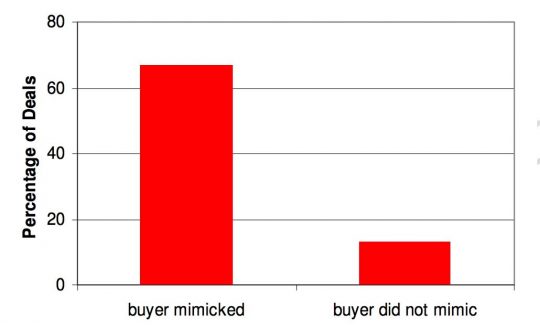A Remarkably Powerful Way to Increase Sales Success
 If you want to succeed in sales, be more effective in negotiation, or get cooperation from a team member, the research I’m about to describe demonstrates an amazingly powerful technique you can use.
If you want to succeed in sales, be more effective in negotiation, or get cooperation from a team member, the research I’m about to describe demonstrates an amazingly powerful technique you can use.
Why do I describe the technique as “powerful?” It’s because I’m used to seeing social science studies that describe results that are statistically significant but which, in absolute terms, are less than awesome. Sometimes, the published paper magnifies the effect of the test condition by clever graph design.

The two charts above represent the same data, but the one on the right has a much bigger “wow” factor because of the smaller range on the vertical axis. (This is called a “truncated graph” and isn’t necessarily misleading – it can help illustrate small differences as well as save space.)
So, when I read about a study that showed an increase from 12.5% to 67% in successful sales outcomes, I knew I had to share it.
The experiment involved a simulated sales exercise in which a buyer and seller attempted to reach a deal on the sale of an asset. Though the price goals of the two parties were apparently not compatible, there were hidden objectives that would allow a deal to be reached. But, the negotiators would find that solution only if they shared information and cooperated to meet each other’s needs.
So, what was the magic that produced a fivefold lift in successful outcomes?
It was mimicry.

When one party mirrored the gestures of the other, the number of successful negotiations increased dramatically. Note that in the above chart, there’s no axis manipulation – the difference is actually that big!
Study: Mimicry improved #sales and #negotiation outcomes 400%. #Neuromarketing Share on XTrust Me, I’m Using Mimicry
With some additional analysis, the researchers isolated the reason mimicry worked: trust. The person who was being mimicked trusted the imitator more.
The paper further notes,
Want to build trust? Mimic the actions of the other person. #Neuromarketing #sales Share on X…none of the participants who were mimicked noticed that their opponents were copying their behaviors, suggesting that the effects of being mimicked occurred automatically and unconsciously…
…it is compelling that our effects emerged even when participants with no prior training in strategic mimicry received a brief instruction to mimic just prior to a very complex task that demanded substantial mental concentration.
No Training, No Preparation
Mimicry has been cited before as a way of connecting with another person. But, the results of this study show how powerful it can be.
Equally important, you don’t have to be a trained actor or negotiator to do this. The subjects were MBA students, and the “mimic” group were told what to do immediately before the negotiation began. They had no time to practice, or even plan their actions.
Despite the lack of any training or preparation, the technique was extremely effective at building trust. And, equally important, none of the non-mimickers noticed the less-than-expert mirroring.
Here's a no prep, no training way to increase #sales success. #Neuromarketing #sales Share on XSo, don’t worry about your own lack of training.
Don’t be cartoonish or exaggerated in your actions, just try mirroring the motions of your negotiation partner or sales prospect. And, don’t be surprised if it works – science says it should!
Resources: I spotted this study while reviewing Jonah Berger’s new book, Invisible Influence. Listen in (or grab the PDF for later reading) as Jonah explains how to use mimicry in negotiation. And, check out an earlier podcast that covers mimicry in sales, among other topics: Subconscious Selling with Peter McLaughlin. And, to hear from a former top FBI hostage negotiator, check out Chris Voss Negotiation.
And, if you try mimicry, leave a comment to let us know how it went!
